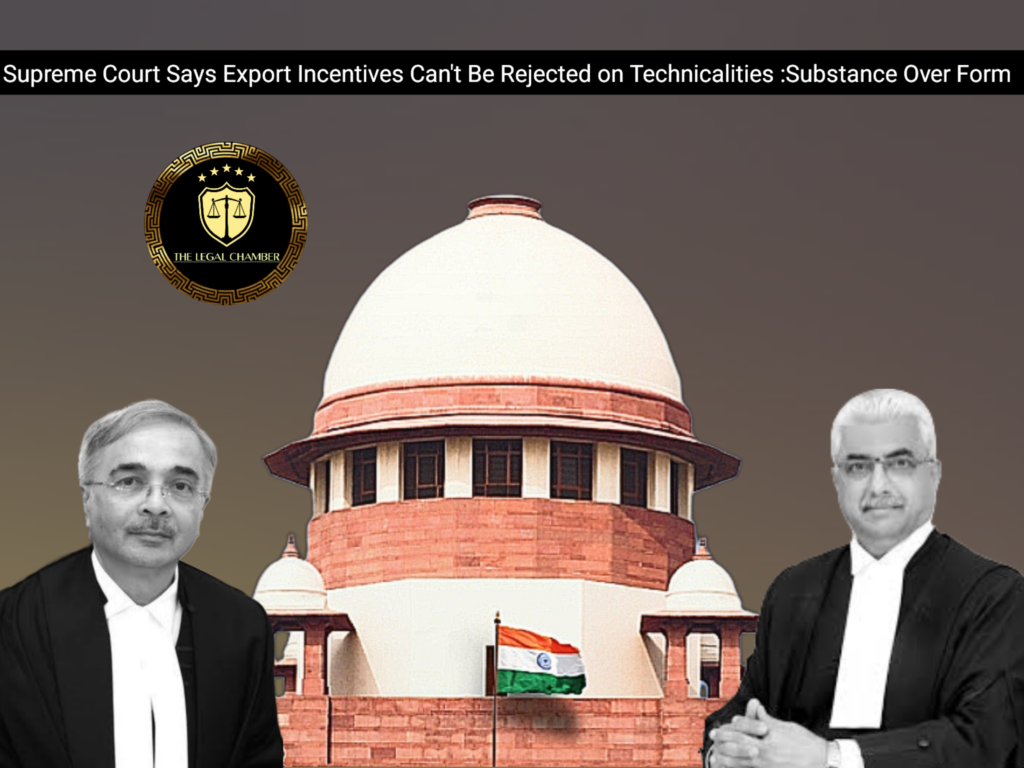
Facts Of The Case:
The appellant, an exporter of corn starch, filed 54 shipping bills electronically through a customs broker for exports made between July and October 2017. The broker inadvertently failed to change the default declaration for claiming incentives under the Merchandise Exports from India Scheme (MEIS) from “No” to “Yes”. This clerical error prevented the automatic transmission of the bills to the Directorate General of Foreign Trade (DGFT), blocking the processing of their MEIS reward claim. Upon discovering the mistake, the appellant successfully applied to the Customs Authority to amend all shipping bills under Section 149 of the Customs Act, 1962, which officially corrected the declaration to “Yes”. However, the DGFT refused to process the amended claims, citing system constraints that disallowed manual intervention for bills not originally filed with a “Yes” declaration. The appellant’s subsequent plea to the Policy Relaxation Committee (PRC) was summarily rejected without a hearing or a reasoned order, leading them to file a writ petition before the Bombay High Court, which was dismissed. The core factual dispute was whether this corrected procedural error could legally deny the exporter’s substantive claim for benefits.
Procedural History:
The procedural history of this case began with the appellant’s representation to the DGFT and a successful application to the Deputy Commissioner of Customs, Mundra, which resulted in the amendment of the shipping bills under Section 149 of the Customs Act. Following the DGFT’s refusal to process the amended claims, the appellant approached the Policy Relaxation Committee (PRC), which rejected the application without providing reasons or a hearing. This led to the filing of Writ Petition No. 4095 of 2019 before the Nagpur Bench of the Bombay High Court. During the pendency of this petition, a significant judgment in Portescap India Private Limited v. Union of India was delivered, which the appellant brought to the Court’s attention. Nonetheless, the High Court dismissed the writ petition on August 2, 2021, prompting the appellant to file a Special Leave Petition (C) No. 14919 of 2021 in the Supreme Court, which granted leave and culminated in the present appeal.
READ ALSO:Supreme Court Slams “Ad-hocism”: Orders Regularization of Employees After 30+ Years of Service
Court Observation:
The Court made several key observations, emphasizing that the inadvertent procedural error of marking “No” instead of “Yes” in the shipping bills was clerical in nature and did not negate the appellant’s substantive right to claim MEIS benefits for genuine exports. It held that once such an error was statutorily corrected under Section 149 of the Customs Act, the amended bills must be acted upon, and the exporter’s entitlement under the beneficial scheme could not be defeated by systemic rigidity or technical constraints. The Court further strongly deprecated the Policy Relaxation Committee’s arbitrary rejection of the claim without providing reasons or a hearing, stating it violated principles of natural justice. It also observed that administrative technology must aid, not obstruct, the implementation of the law and directed the concerned authorities to take measures to prevent such needless litigation in the future.
Final Decision & Judgement:
The Supreme Court allowed the appeal and set aside the judgment of the Bombay High Court. It quashed the rejection order passed by the Policy Relaxation Committee and issued a mandamus to the respondents, directing them to process the appellant’s claim for MEIS benefits based on the corrected shipping bills. The authorities were ordered to pass appropriate orders in accordance with the law within a period of twelve weeks from the date of the judgment. While refraining from imposing costs, the Court underscored the need for systemic reforms to ensure that genuine exporters are not compelled to litigate due to such inadvertent and rectified procedural errors.
Case Details:
Case Title: M/S Shah Nanji Nagsi Exports Pvt. Ltd. vs. Union of India & Ors. Citation: 2025 INSC 1032 Appeal Number: (@ Special Leave Petition (C) No. 14919 of 2021) Date of Judgement: August 19, 2025 Judges/Justice Name: Justice Aravind Kumar and . Justice N.V. Anjaria
Download The Judgement Here